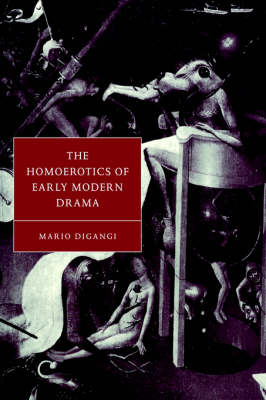Cambridge Studies in Renaissance Literature and Culture
1 total work
This book is the first comprehensive account of homoeroticism in Renaissance drama. Mario DiGangi analyses the relation between homoeroticism and social power in a wide range of literary and historical texts from the 1580s to the 1620s, drawing on the insights of materialist, feminist and queer theory. Each chapter focuses on the homoerotics of a major dramatic genre (Ovidian comedy, satiric comedy, tragedy and tragicomedy) and studies the ideologies and institutions it characteristically explores. DiGangi examines distinctions between orderly and disorderly forms of homoerotic practice in both canonical and unfamiliar texts. In these readings, the various proliferating forms of homoeroticism are indentified in relation to sodomy, against which there were cultural and legal prohibitions in the period. DiGangi's study illuminates, through a diverse range of plays, the centrality of homoerotic practices to household, court and city life in early modern England.
